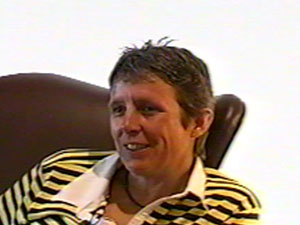"I was on a camp crew. That was a cushy job."

I was on a camp crew. That was a cushy job. We were on camp crew up in Idaho, outside of McCall, and they'd gone in and commandeered a Forest Service campground, right there on the Salmon River. Usually camp crews are just like a YCC group, or pickup crews that they get from outside the Forest Service, and I don't know how we managed to be camp crew. But we were working fourteen-hour split shifts, so we'd have seven hours on, and we'd have a couple-hour break, and then seven hours on again. And we were kind of working the afternoon shift, because we'd feed crews until ten, eleven o'clock at night. And so basically, what our job was, pack their lunches, and then go around and kind of police the camp, pick up litter and pick up whatever was left over from the lunch situation. Then be ready for dinner.
They had caterers there, so we didn't really have to do any of the food stuff, we just had to be there to empty the garbage cans and wipe the tables down…That was nice, because we were on the Salmon River, so every afternoon, we went swimming. And then we knew, we were in camp, I was sort of like the radar for the camp, because I had friends that worked down in Supply, we were working with the caterers.
There was a campground host and hostess that were like—you know how they have the campground people that kind of hang out there all summer long, and they're the "Hi, how ya' doing" kind of people. They let them stay, and they kicked everybody else out. And I saw the lady diving in the dumpster, getting cans out, and there's tons of aluminum cans, because there's tons of pop and stuff, and I was saying to my friend Elizabeth, "You know, it's too bad we can't figure out some way to get some of this stuff recycled, because I just hate to throw all this aluminum away." And that's when we saw the lady diving in the dumpster, and it turned out [she] and her husband would collect cans for their grandkids, and then they'd take the cans in, cash them in, and keep the money, and when the grandkids came, they gave them the money. And so we said to her, "Hey, if we get some cans, do you guys want them?" And they said, "Oh! we'd love that!" So I had friends in Supply, and I traded a couple of cases of cold pop for a couple of extra garbage cans, and we set up recycling bins. We figured we got about 40 percent of the cans.
Well, these people were so grateful that we were doing this, that they wanted to do something for us. And we were like, "Look, you are, you're getting these cans recycled for us. That's what we would like." And they said, "Well, how about we do your laundry? We know that you can't do laundry and you don't get clean clothes. How about we do your laundry?" And we're like, "Okay, we'll let you do [our] laundry." So we were taking our laundry over to them, and every day we were getting clean clothes on, and all the rest of our coworkers are complaining, because they're wearing the same socks for the third day in a row. My biggest fear was that we would walk—because they would hang our clothes out to dry—and we'd be walking by their campsite, and there's my shirt hanging out to dry, and I was just hoping that nobody else on my crew would recognize that that's my shirt on the clothesline over there. But it was nice.
We also knew the guys that ran the shower. So you could barter and get them to turn the showers on early. So it was nice, because when we had our two hours off, then we'd go down, we'd swim in the Salmon River, kind of relax on the sand bar. Then we'd go up and take a shower and put our clean clothes on. Like I said, everybody else was just (growling) "When are we going to get with the laundry?" "I don't know, I'll ask." (laughter) I didn't have the heart to tell them every day I had clean clothes on. So that was one of the kind of things that you'd do.